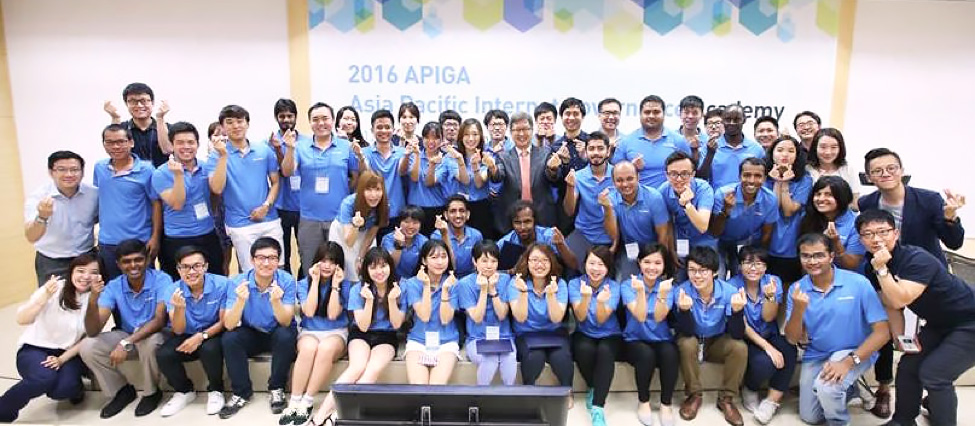
APIGA participants and trainers showing their love for the APIGA program. The hand sign is a Korean “heart.” (Photo Credits: KISA)
“Any questions?”
The usual question at the end of a lecture is also, quite often, the lecturer’s dreaded start to an uncomfortable spell of silence – at least in this part of the world. But not with this group. The attendees were eager to participate – hands shot up at every opportunity, and not just for questions, but to offer their own opinions.
Turns out, this was a group of 45 Asia Pacific youth leaders attending the inaugural Asia Pacific Internet Governance Academy (APIGA), a five-day capacity building program held in Seoul’s Yonsei University from 8–12 August.
The academy was organized jointly by the Korea Internet and Security Agency (KISA) and ICANN, in partnership with regional organizations such as the Asia Pacific Network Information Center (APNIC), Internet Society (ISOC), DotAsia organization, and other members of the Asia Pacific Internet community. The program was aimed at nurturing the next generation of Internet leaders to be the region’s voice and preparing them to participate in the global multistakeholder Internet governance ecosystem.
We made sure that the APIGA program was rigorous by design, starting from the selection process. The selection committee sieved through more than 120 applications to identify the most qualified candidates. Before attending the academy, participants had to complete an intensive ISOC online course on Internet governance, as well as a specially customized ICANN Learn program that totaled 25 hours. This definitely paid off, as many participants were able to engage in in-depth discussions over the course of the academy.
The program covered topics ranging from the history of Internet governance, the Internet ecosystem and infrastructure, the state of Internet governance in Asia Pacific nations, the Internet of Things, online privacy and more.
In addition, a substantial portion of the program was dedicated to ICANN and ICANN-related topics, such as ICANN’s multistakeholder model, the Internet Assigned Numbers Authority (IANA) Stewardship Transition and Internationalized Domain Names (IDNs). The academy culminated in a mock-ICANN meeting. These sessions helped the attendees gain a better understanding of how to participate in ICANN policy work, as well as what it takes to achieve consensus in a bottom-up fashion.
Breeding ground for Asia Pacific leaders
In the words of South Korean participant Lee Donggi, 23, the academy is “a great stepping stone” for youths to get acquainted with and be involved in the important work of the region’s Internet organizations. It also serves to fill a real capacity building gap in Asia Pacific – both in terms of a lack of understanding of key Internet Governance topics, as well as the confidence to speak up due to cultural inhibitions.
Our hope is that APIGA can be a conduit from which these promising future leaders can start participating in the work of ICANN and our region’s multistakeholder community. Already, the participants show great promise; expect to see some of their faces and hear their voices at upcoming meetings! Some of the participants also intend to conduct their own outreach about Internet governance using the materials they obtained from the academy. Indeed, they will be our best “ambassadors”.
While the event has ended, the work has barely started – continuity and follow-up will now be important to ensure that the APIGA class of 2016 stays engaged. To this end, we will be working with our regional partners to keep the participants informed about our work and find ways to involve them.
Indeed, the first APIGA is not only a KISA-ICANN event, but a regional capacity building initiative, and we hope that a 2nd APIGA can be held next year. As our next generation leaders continue to participate in the global multistakeholder Internet community, I hope that in the near future, Asia Pacific stakeholders will no longer be seen as reserved or quiet. Rather, they will be full of confidence and willing to speak up, just like the APIGA class of 2016!

APIGA participants in action
Read about the reflections and takeaways by Mariko Kobayashi, a Japanese computer science student who participated in APIGA here. Event summary and APNIC activities at APIGA can also be found in this blog by Robbie Mitchell.
Visit the APIGA website and APIGA Facebook page for more information and photos.

